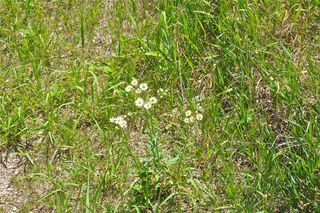
OnEarth: The Great Green Desert

Julene Bair is the author of "The Ogallala Road, A Memoir of Love and Reckoning." Her first book, "One Degree West: Reflections of a Plainsdaughter," won Mid-List Press's First Series Award and a WILLA Award from Women Writing the West. Bair's essays have appeared in venues ranging from the New York Timesto High Country News. This article was originally published by OnEarth magazine. Bair contributed this article to Live Science's Expert Voices: Op-Ed & Insights.
If, like me, you grew up on family land, then you will know what I mean. The land contains you, and you can't really differentiate between what it is and who you are. Yet you can leave, because your family will always be there, keeping you one with the land. You don't realize they are performing this service or that you need them to.
I left Kansas when I was 18, headed for excitement, I suppose. But the most exciting thing I did in San Francisco was to leave it 12 years later for the Mojave Desert, to live alone in a remote mountain cabin surrounded by more than a million acres of wilderness. As for thrills, nothing beat taking icy dunks on hot afternoons in a big windmill-fed tank where a rancher stored water for his cattle. Although I didn't realize this at the time, I fell into that water-worshipping, desert-loving groove because I'd been born in it.
My family's western Kansas farm may not have been as dry as the Mojave, but the 1820 Stephen H. Long expedition across the High Plains dubbed the region the Great Desert for good reason. Were it not for the water our windmills pumped, we couldn't have survived there. And to make a living, my father had to practice "the science of farming where rainfall is deficient." The historian Walter Prescott Webb should have added the words art and obsession to his definition of dry-land farming. My father nurtured the moisture in his wheat fields so deftly and assiduously that, until I grew up, I didn't even know we'd had a drought during my 1950s childhood that rivaled the Dust Bowl of the 1930s.
After jumping into 60-degree water on 100-degree days, the most thrilling thing I did in the Mojave was marry this charming cowboy with a drinking problem. I thought I could reform him. When it proved I couldn't and I became pregnant, I left him for the safety of home. Suddenly, instead of floating on the crystalline waters of that stock-water storage tank, I found myself standing waist-deep in my father's tailwater pit, a bulldozed hole in the ground where he caught runoff from his flood-irrigated fields. I did that only once. The tepid water was ecru, the color of dirt, and, as I would soon learn, saturated with farm chemicals.
Although our entire history in that place depended on farming within the climate's limits, my father, like his neighbors, had grasped on to new technology allowing him to irrigate out of the vast but virtually non-renewable Ogallala Aquifer. I did the math and figured out that in less than a century, if our family continued pumping nearly 200 million gallons every growing season, the water under our land would be gone.

I may have gotten over the cowboy, but I hadn't forgotten the desert's wild beauty or Kansas when it was still wild enough for me to imagine Indians chasing buffalo across the prairies. Aridity had given the grass that stretched beyond our farmhouse this transfixing blue-green cast that had perfectly complemented our pale blue, overarching skies. And although I didn't have to live in the desert to know this in my bones, I now knew it in my head: water is precious.
Sign up for the Live Science daily newsletter now
Get the world’s most fascinating discoveries delivered straight to your inbox.
My father wanted to train me as his successor — a great honor in a place where ideas about men's and women's work had always been rigid. But if my land ethic were a line in the dirt like the ones my toddler son loved to draw with a stick, it would be exactly perpendicular to the one representing my father's: Make all the money you can, no matter how much native grass you plow or how much poison you spray or how much water you pump.
Though it saddened my father when I told him I wanted to go back to school, he forked over quite a few irrigation dollars to help. And though it saddened me that he was farming unsustainably, I thought I could accept his aid and leave once again without a backward glance, still confident that, because our land would always be there, I would always be me.
A little more than a decade later, my father died, leaving me part-owner of what he'd considered a lucrative paradise and what I considered a travesty against the land's natural gifts and character. Who was I now?
If you were raised on a farm, then you probably know this too: The chickens always do come home to roost.
Follow the author @JuleneBair. This article first appeared as "The Great Green Desert" on OnEarth.org. Follow all of the Expert Voices issues and debates — and become part of the discussion — on Facebook, Twitter and Google +. The views expressed are those of the author and do not necessarily reflect the views of the publisher. This version of the article was originally published on Live Science.
